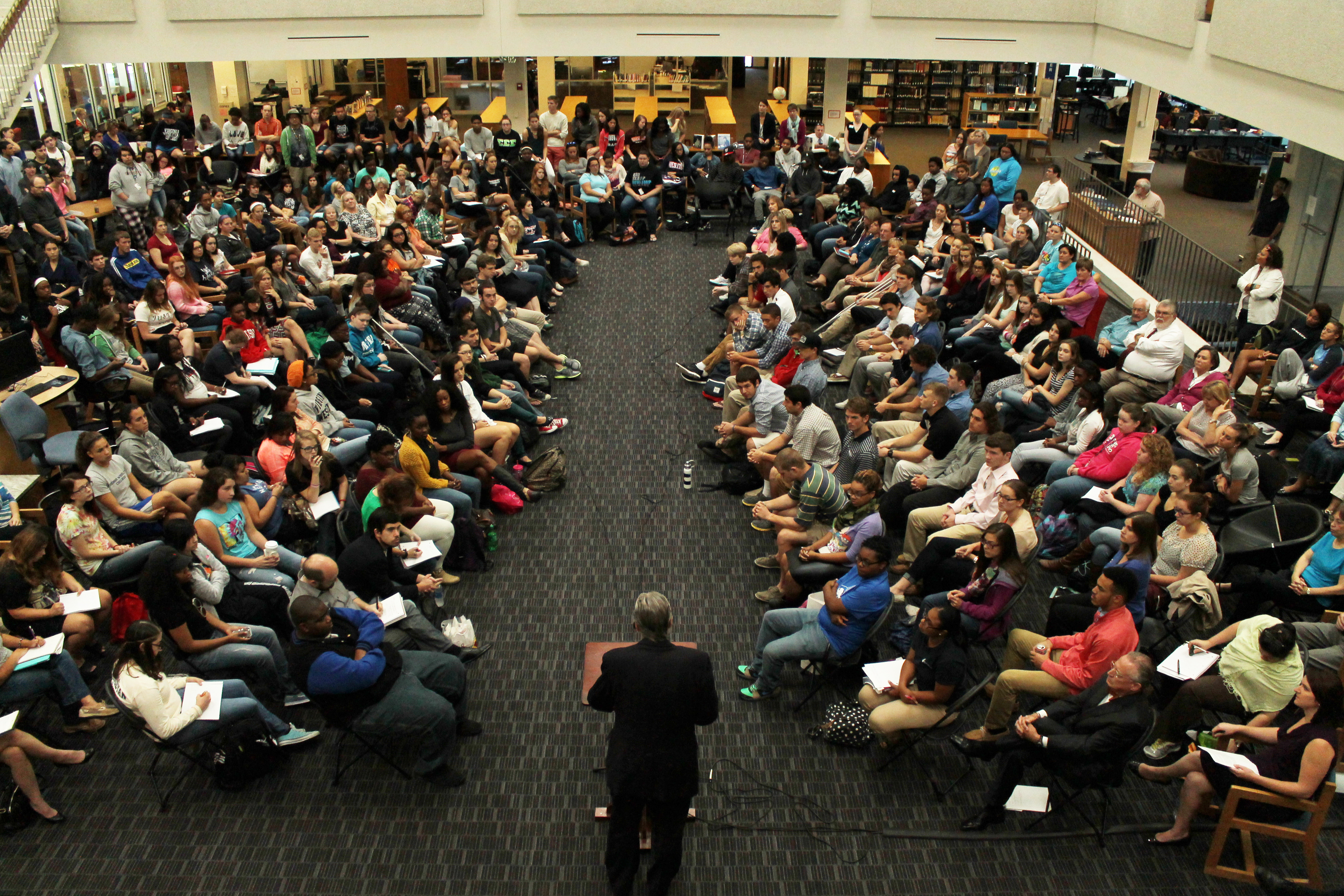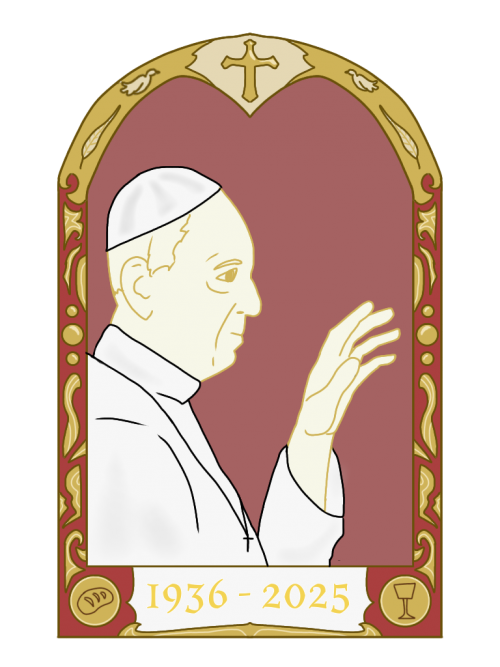I am Virginia Wesleyan and I am disappointed and angry and confused and grieving and desperate to know each side” – Craig Wansink
By Aoife Branco
The atmosphere was so thick, it could be cut with a knife. People sat perched atop tables; bookshelves became seats and the floor was slowly disappearing as more and more students, faculty and staff filed in. To gain a better view people ventured to the second floor, giving them an overhead perspective of the meeting; others found a unique vantage point from the staircase. As the first speaker approached the microphone and tapped it a few times to ensure it was working. The room filled with hundreds of people instantly silenced as everyone held their breath, waiting to finally release the tension.
“I am Virginia Wesleyan”, Craig Wansink Professor of Religious Studies and Director of the Joan P. and Macon F. Brock, Jr. Center for the Study of Religious Freedom said . “I am a professor of religious studies. I am bemused that today is national conflict day… I am Virginia Wesleyan and I am disappointed and angry and confused and grieving and desperate to know each side. I am Virginia Wesleyan and I am perplexed about that letter and every single day I want to ask questions. I am Virginia Wesleyan and, as it turns out, I am impatient.”
The Virginia Wesleyan community met in one of the largest gatherings to date, the VWC Community Council. Faculty, staff and students packed into the Hofheimer library Thursday, October 16, to discuss issues they had regarding the Jane Doe sexual assault lawsuit.
“The last community council I remember was when we were trying to switch to the four by four credit system,” Robin Takas, director of instructional technology said. “The attendance was so low, only about 10 students participated. We have scheduled community councils in the past, but there was always a tendency to cancel them because there was nothing of urgent business to address and students just didn’t show up.”
Community Council serves as an occasional forum to discuss and exchange information on issues of interest to the entire college community. A meeting of the Community Council can be called at any time that members of the VWC community feel there is an issue of interest to the campus.
“This gathering of people is an act of faith in you and a testament of the values that bind us together as a community,” said Dean O’Rourke, vice president for academic affairs, Dean of the College and Professor of Political Science. “Today, it’s not my words that count, it’s your words that count.”
O’Rourke’s sentiments were echoed by all of the faculty that spoke at the beginning of the council.
“We have a responsibility here,” said Assistant Professor of Political Science Leslie Caughell. “We can always do better, we all rise and fall together. Tell us how we can do better. It is your turn to talk and we are all listening.”
Listening was very important at this point in time, after all, students had much to say. The goal for this particular Community Council was to to offer a space where the voices of all members of the community could be heard, in the spirit of expressing their concerns and making constructive suggestions for the future.
“I understand there are as many different emotional reactions as there are people in this room,” Greer said. “Each of us is personally affected by this because others are talking about us and that is personal.”
The council came to fruition as a result of faculty initiative.
“Last Wednesday, a group of members of the faculty met to discuss the issues the lawsuit raises,” Associate Professor of English Stephen Hock said. “Dean O’Rourke also attended that meeting. In that discussion, a consensus emerged that it would be a good idea for Community Council to meet as soon as possible, so that the members of the college community, especially students, could have their voices heard on the issues raised by the lawsuit… [we] then contacted the members of the Agenda Committee to check that a majority of them agreed that Community Council should meet, and that was that.”
Because the lawsuit is pending, college administration could not comment on specific aspects of this case.
“We are limited about what we can say,” Greer said. “We have to keep in mind the privacy of our students. Because of this, the resulting coverage is one sided and only shows one side’s allegations”
Many students recognized that the privacy of those involved was important, but that the schools decision to refrain from any comment was frustrating.
“I personally take a lot of pride in being at Wesleyan,” said senior Paul Kaufmann. “That being said, it’s really difficult to find that pride when the only structured opinion is one that is coming from the outside. I just think there was a better way to handle this.”
Although the facts of the case were not specifically discussed, the community did discuss the other issues the case raised. Many students addressed issues with the case in the context of perpetuating rape culture.
“If we allow a precedent like this [case] to exist, it will keep happening,” said sophomore Emily Joy. “I am worried about the potentially hostile environment this could create. I know the last thing that we want is to sustain a culture that says that rape is ever okay”.
Women Against Violence Against Women says rape culture is, “A term that was coined by feminists in the United States in the 1970’s. It was designed to show the ways in which society blamed victims of sexual assault and normalized male sexual violence.”
Clubs like Phenomenal Women and The Red Flag Campaign focus on empowering individuals to take ownership of themselves.
“We have a responsibility to one another as students,” said President of Phenomenal Women and senior Sarah Nwokorie. “We have to look out for one another. You have to say something when you see something”.
The tension in the room began to slowly lift as more students and faculty approached the microphones to voice their opinions and concerns.
“I owe a lot to VWC; it has impacted my life in so many ways”, said Student Government Association President and senior Immani West. “Argument and debate is a healthy thing, it bridges the gaps between people and allows us to understand each other. When we have an issue, we need to be transparent about it and we need to talk about it. Our biggest fears are not of things that are known, it is the fear of the unknown.”
It is still unclear what steps will be taken in response to the concerns and questions that were raised at the council. However, there is a hope that this forum will spark a larger conversation in the community.
“I hope that [this is] the beginning of a discussion of the issues the lawsuit raises, not the end of the discussion,” said Hock. “I hope that it makes clear that all members of the college community, students, faculty, staff, and members of the administration, need to be involved in that discussion”.
Although the administration could not comment on the specifics of the case, the issues raised among the community indicates a long road ahead in solving these problems. The community has voiced their opinions and the administration has an opportunity to make lasting change.
“Thanks for being here,” O’Rourke said. “Let’s get to work.”

